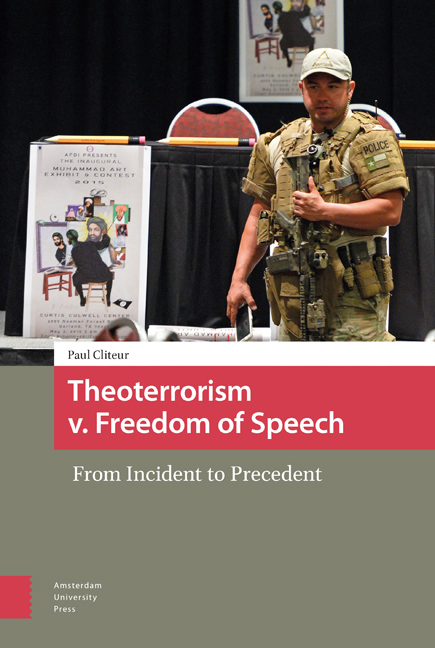Book contents
5 - The Rushdie Affair and Charles Taylor
Published online by Cambridge University Press: 21 November 2020
Summary
As writers and soi-disant intellectuals, it is most often our job to stress complexity, to point out with care and attention that “it's not as simple as that.” But there are also times when it is irresponsible not to stress the essential clarity and simplicity of a question.
Christopher HitchensWhat is ridiculous needs to be ridiculed.
Paul BermanSo far, my analysis of the tension between theoterrorism and free speech has been roughly historical. I started with the Rudi Carrell Affair in 1987 (Chapter 1). Then I tried to show how, from this affair, with its focus on a Dutch show master, in the Netherlands several instances arose where free speech collided with theoterrorism (Chapter 2). The most notorious and fatal conflict was that resulting in the murder of the Dutch filmmaker Theo van Gogh on 2 November 2004. This event triggered Danish journalists to organize an experiment to test whether free speech was in jeopardy in their own country, Denmark, as well in the Netherlands. This developed into the Danish Cartoon Affair of 2005.
Between 1987 (Carrell) and 2005 (Westergaard), there was another great conflict between free speech and theoterrorism. This was, of course, the controversy that arose as a result of the publication of Rushdie's novel The Satanic Verses and was foreshadowed, as I have argued in Chapter 1, by the Carrell Affair.
Rushdie's book, published in the United Kingdom by Viking Penguin on 26 September 1988, caused great controversy. After so many years of accidents, incidents, and precedents we tend to forget how great this first global clash between Islamist terrorism and civil liberties was. The following are only the incidents that occurred in the first year after publication.
On 5 October 1988, the book was banned in India and on 24 November, in South Africa. On 14 January 1989 copies of The Satanic Verses were burned in Bradford, England. On 27 January demonstrations took place in Hyde Park and a petition was presented to Penguin to cease publication. On 1 February 1989, Home Secretary Douglas Hurd announced that the British government had no plans to change blasphemy laws in response to Muslim demands.
- Type
- Chapter
- Information
- Theoterrorism v. Freedom of SpeechFrom Incident to Precedent, pp. 123 - 158Publisher: Amsterdam University PressPrint publication year: 2019



